What To Eat Before Running in the Morning
- April 8, 2022
- Last Updated: November 6, 2023
- 0 Comments
- Sports Nutrition
As a sports dietitian, by far, the question I field most often revolves around what to eat before running in the morning and when.
Whether you’re a beginner runner (here are 5 running tips for beginners!) or novice, these nutrition tips apply.
People are confused about what to eat before running, especially what to eat before a long run in the morning, and I’m here to clear up any confusion.
And if you need ideas for what to eat the night before a long run, there’s plenty of insight on that too!
As an Amazon Associate, I may earn from qualifying purchases. You can read more here on our Disclaimer and Privacy Page.
There is a thought that if you can’t stomach food in the morning, you shouldn’t try anything.
But the truth of the matter is, practice counts and it does help. If you suffer from symptoms of runners stomach, you can train your gut to better tolerate food, or change up what you’re eating and when.
Training your gut means helping your body learn to tolerate food in the morning, so that it can turn into energy for a run.
And it’s worth training it to take some fuel in before your morning runs.
But, should you eat before every run? Let’s break down what the guidelines and recommendations say.
In This Article
What To Eat Before Running in the Morning
When deciding what should I eat before a morning run, aim to eat something with mostly carbohydrates and a little protein.
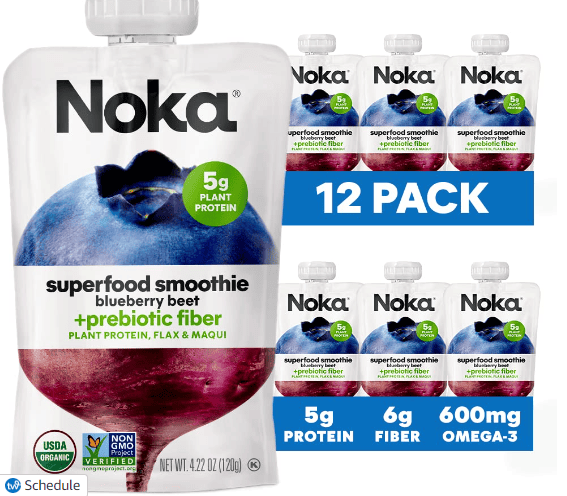
How much you eat will depend on how hungry you are, how much time you have to digest food, and how long you are running.
- For instance, if you are going for a run under 45-60 minutes and at a low intensity, you can likely get by without eating anything. However, you may find that you feel better if you eat something, even if it’s something small, like half of a banana, a noka pouch or a small fig newton bar.
- If you are racing and need to eat before a cross country race, choose something low in fiber and high in carbohydrates to fuel your quick muscle bursts.
- If you are running over 60 minutes, eating something with 30-60 grams of carbohydrates should be a good start and provide enough energy for your run, or at least, the early part of your long run.
There’s no generic best food before a run, but there are guidelines. For more specific details, you can check out this sample long distance runners diet plan.
Eating after a run or race is important too. Consider what to eat after a marathon once you have your pre-run meal or snack figured out.

Why Carbs are Important Before an Early Morning Run
We have to talk about carbohydrates when talking about what to eat before running in the morning because they produce energy the quickest of all macronutrient groups.
Unlike fat, carbohydrates use less oxygen so they are more efficient, and we can convert them to energy much quicker.
As discussed in this research-heavy post about a low carb diet for runners, you can’t run at a high intensity without carbohydrates, or glucose, available.
So, when eating before a 10k or 5k where you are running quickly, make sure to eat sufficient carbs!
Consuming carbs before exercise can increase the rate and efficiency at which the body burns those carbs for fuel during exercise.
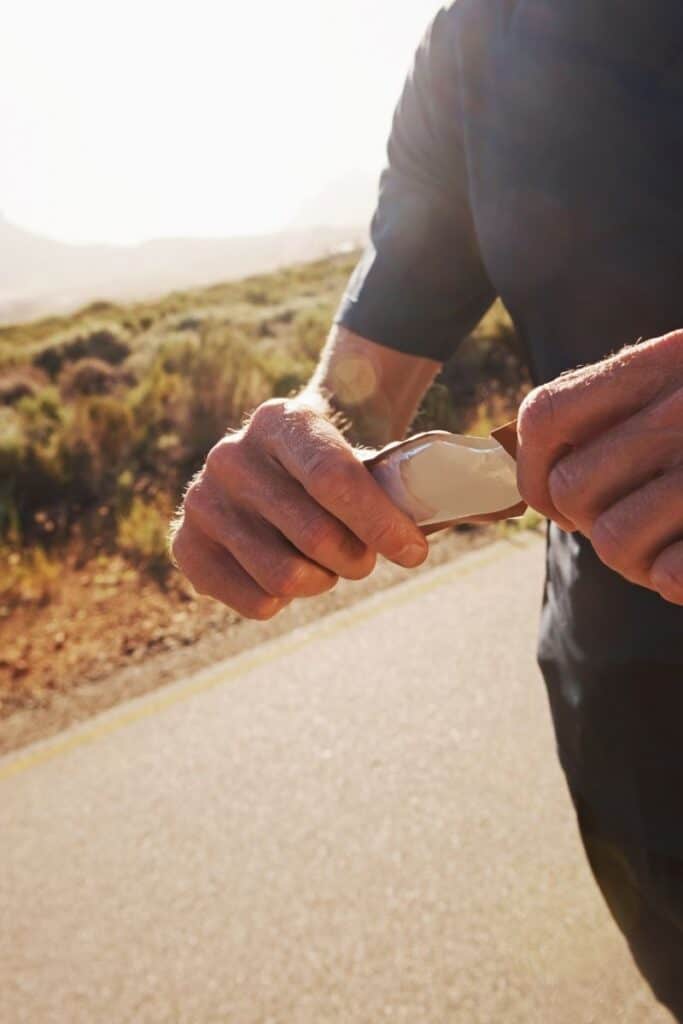
If you plan on running over an hour, you should aim for 30-60 grams of carbohydrates before eating, and then 30-60 grams of carbs for each hour of exercise.
Many runners use energy gels (see my picks for the best energy gels), gummies, running chews or sports drinks to meet these carbohydrate needs.
I also recommend eating more carbs in the morning BEFORE your workout if you have no appetite after a workout to help make up some of the difference.
Easy to Digest Carbohydrates to Eat in the Morning
Here’s a list of some easy-to-digest carbohydrates that I recommend to clients and runners.
- piece of toast or half a bagel
- oatmeal
- cereal
- noka pouch
- baked oatmeal (we love this strawberry baked oatmeal)
- low fiber granola bar
- banana
- juice or sports drink
- half of a fig newton bar
- graham crackers
- gels

When to Eat Before Running
When to eat before a run and how much to eat may depend on how long you’re running as well as how long you have to digest.
- If you are eating 30-60 minutes before a run, you want to aim to eat something smaller, with more simple carbohydrates and less fiber. Check out the easy-to-digest carbohydrate options listed below.
- If you wake up early and have 60-120 minutes to eat before a run, you can eat more calories and carbohydrates because you have more time to digest. Hence, you may want to double your serving size, or increase it slightly. Add an extra piece of fruit on the side.
For some, spreading just a little peanut butter or butter can add a little more “staying power” to your pre-run meal or snack, but too much may cause GI distress for some people, so it’s good to experiment and use caution.
All of these options are also similar options as to what to eat the morning of a race.
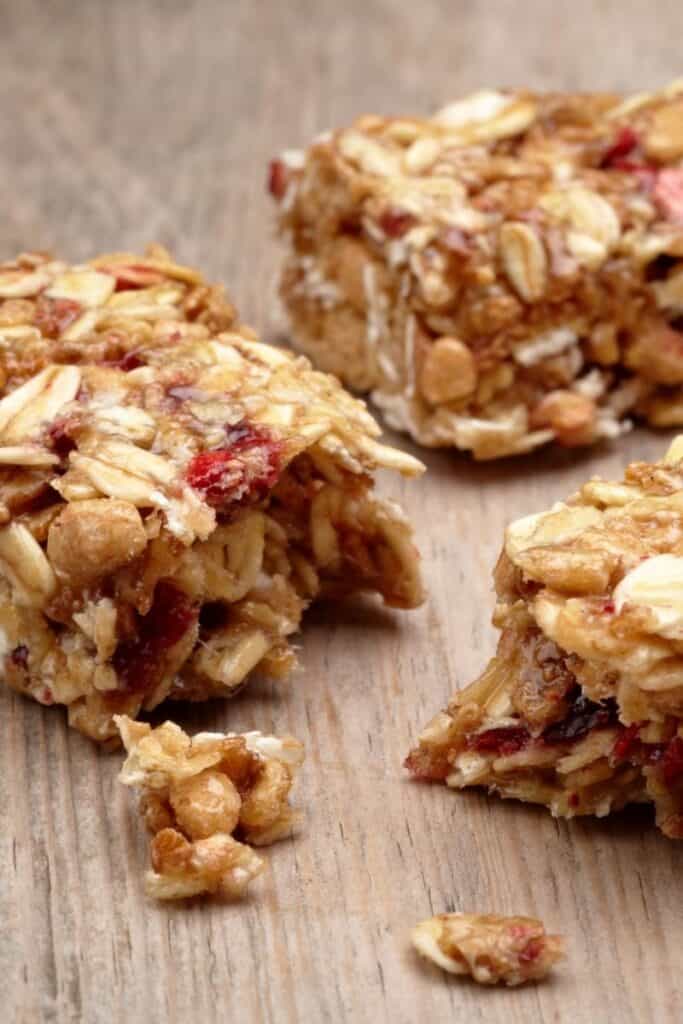
What to Eat The Morning of a Race
When eating the morning of a race, many of your choices and options should be similar to what you’re practicing with during the week during your normal morning runs.
Nothing new on race day, remember! Base your portion size off of how much time you have before the race starts.
For example, I guide many of my athletes to wake up a few hours before the race to eat a carbohydrate-rich meal, such as oatmeal or a bagel. Allow 60-90 minutes for it to digest.
If you are racing a shorter race, like a 5k or 10k, this is probably plenty. However, if you’re running a half marathon or full marathon, you may want to add a “top off” snack.
A top-off snack is a carbohydrate-rich snack that you would eat 30-45 minutes before the run, to top off your glycogen stores.
Some examples include:
- banana
- sports gel or chews
- sports drink (with carbohydrates)
- half of a fig newton bar
- graham crackers
- piece of toast or small bagel
Research indicates that filling up on a high-carbohydrate breakfast before a long run or endurance event can increase exercise capacity by 9% compared to a fasted run.
This means that the rate of perceived exertion was lower, the Vo2 max was higher, and running was more efficient. Of course, what you take in during your (long) run or race can improve upon this as well.
This post about race day breakfasts also offers more ideas!
Research indicates that filling up on a high carbohydrate breakfast before a run can increase exercise capacity by 9% compared to a fasted run.
Chryssanthopoulos, C., Williams, C., Nowitz, A., Kotsiopoulou, C., & Vleck, V. (2002).
We share some ideas in this race day nutrition post and half marathon nutrition 101.

What To Eat Night Before a Long Run
When thinking about what to eat the night before a long run, you again want to focus mostly on carbohydrates and build your plate from there.
The reason for this is that you want to load up your glycogen stores for your run.
Your body will rely on whatever energy you take in during the run, as well as glycogen stores, to perform and maintain performance.
- You can use these performance plates for runners as a visual guide for making your plate the night before a race or long run.
- A good guide is to make half of your plate carbs, whether that be grains, potatoes, sweet potatoes, pasta, bread products, tortillas, or adding fruits to your dish.
- Pasta for running is a great pre-race meal, or any of the best carb loading foods for running.
Plus, ideally, you’ve been carb loading before the race a couple of days before so you don’t have so much pressure on you for what to eat the night before a long run or race only.

Pre-Race Recipes for the Night Before
Here are some recipes I recommend for eating the night before a race.
- Sweet potato burgers
- Sheet pan salmon and veggies (reduce or omit the veggies if you have a sensitive stomach)
- Sweet potato Spaghetti
- Veggie Pasta Bake
Personally, I love having pizza the night before a long run – it’s high in carbs, can add some protein, and lots of sodium to help with staying hydrated.
More on how electrolytes for runners help with hydration.
And while we put a lot of emphasis on the night before a long run, don’t forget about the morning and afternoon before a long run or race too.
Carbs should be your main focus throughout, especially in the couple of days leading up to race day or a long run.
We love to recommend many of these high carb lunches for runners in these scenarios.
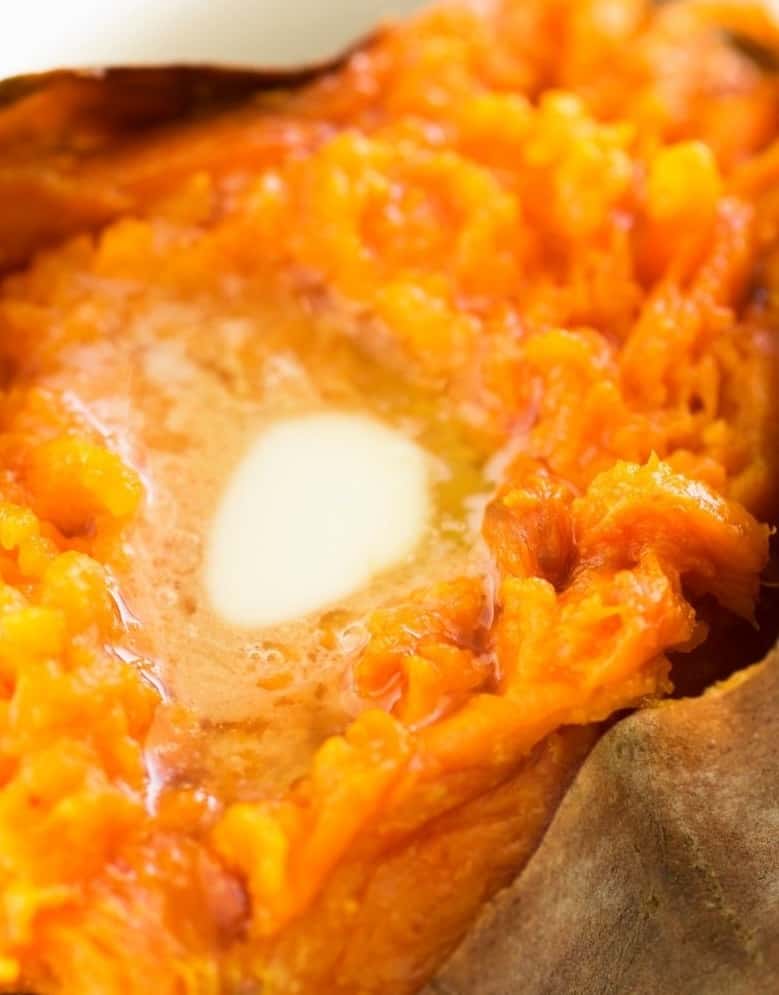
What Not to Eat the Night Before a Long Run
In terms of what not to eat, let’s monitor fiber, which can cause bloating and digestive upset for some people.
High-fiber veggies and foods are something you may want to cut back a bit. One night without your usual amount of vegetables will not make or break your health.
We recommend not eating these foods the night before a long run if you have a sensitive stomach.
- Raw vegetables and cruciferous veggies, especially, such as broccoli and cauliflower
- Other high fiber options, like beans, lentils and certain whole grains, that take longer to digest.
- Artificial sweeteners and sugars, which can cause digestive upset for some people.
- Greasy, high-fat foods. Fat takes longer to digest and may cause some discomfort for some people.
Some people can handle these foods just fine, but practicing and knowing what your body can handle is power before a long run.

Should You Ever Run Fasted?
I know that fasted running is trending but that doesn’t mean it’s evidence-based or what you should do.
Like I tell my athletes, you could do it, but should you? It’s similar to gearing up for a long road trip without filling up on gas or packing any snacks.
You’ll have to stop a lot more (ie – you are much less efficient) and can’t be on cruise control.

As mentioned earlier, fasted running shouldn’t be a major issue if you have a short, low intensity run on the schedule. However, the caveat here is that you ate an adequate dinner last night.
If you ate a very early dinner, it may make sense for you to eat before running the following morning because your glycogen stores may be bare, and you may feel physically hungry.
Even something light can bring your blood sugar up, and prevent the muscle protein breakdown that happens when running fasted.
This post on running and intermittent fasting also goes into more depth about the pros/cons.

While there is some merit to the adaptations that occur when training fasted (you may have heard of “fat adapted”), these don’t necessarily translate to performance improvements.
In fact, these metabolic adaptations impair training intensity and duration, and may even decrease the efficiency of digesting carbohydrates.
Fat burning does not necessarily equate to fat loss, so running fasted in an effort to lose more fat is not necessarily the answer.
Without carbohydrates or food to digest, the body will rely on fat for fuel (which is much less efficient than carbohydrates). This may impair your later recovery as well.
Also, contrary to what many people think, fat burning does not equate to fat loss.
A systematic review of studies involving military members who were fasting for Ramadan found that intermittent fasting was associated with hypohydration and electrolyte imbalances, sleep disruption, and energy deficits, all of which are known to negatively impact performance.
Check out these other running posts
- Pantry staples for runners
- Intuitive eating for runners
- Stomach pain after running
- Foam rolling for runners – How and why to do it
References:
- Edinburgh, R. M., Hengist, A., Smith, H. A., Travers, R. L., Koumanov, F., Betts, J. A., Thompson, D., Walhin, J.-P., Wallis, G. A., Hamilton, D. L., Stevenson, E. J., Tipton, K. D., & Gonzalez, J. T. (2018). Preexercise breakfast ingestion versus extended overnight fasting increases postprandial glucose flux after exercise in healthy men. American Journal of Physiology-Endocrinology and Metabolism, 315(5), E1062–E1074. https://doi.org/10.1152/ajpendo.00163.2018
- Chryssanthopoulos, C., Williams, C., Nowitz, A., Kotsiopoulou, C., & Vleck, V. (2002). The effect of a high carbohydrate meal on endurance running capacity. International journal of sport nutrition and exercise metabolism, 12(2), 157–171. https://doi.org/10.1123/ijsnem.12.2.157
- Spriet, L. L. (2014). New Insights into the Interaction of Carbohydrate and Fat Metabolism During Exercise. Sports Medicine, 44(S1), 87–96. https://doi.org/10.1007/s40279-014-0154-1
- Linderman, J. K., & O’Hara, R. B. (2020). Effects of intermittent fasting on performance in U.S. military personnel while operating OCONUS: A review. Journal of Exercise Physiology, 23(3), 1-12
Support Bucket List Tummy







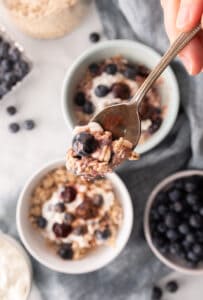

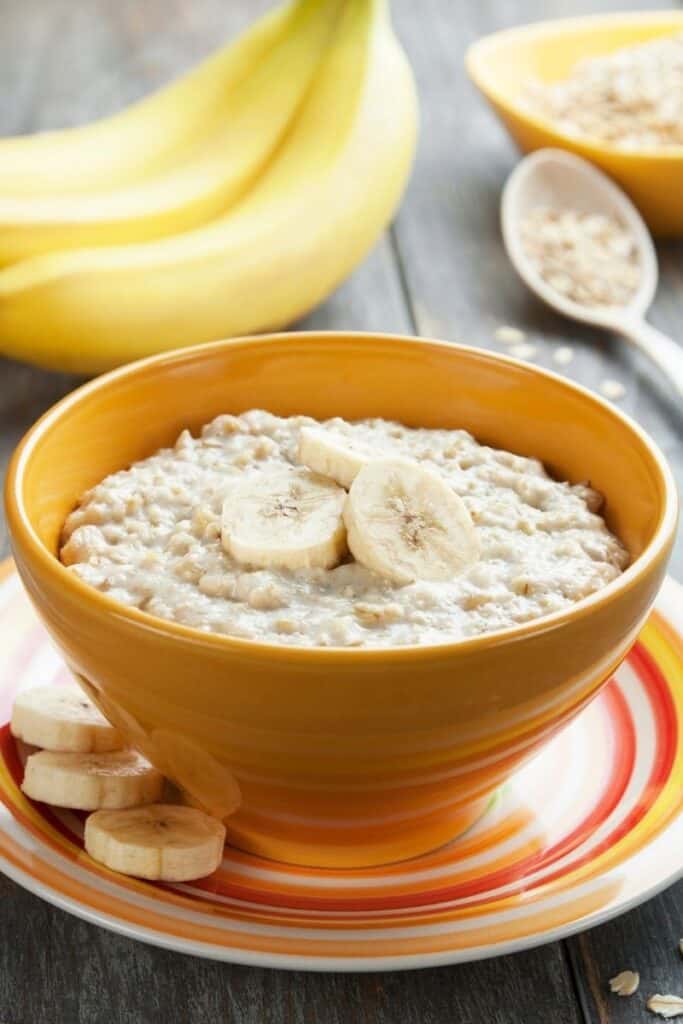


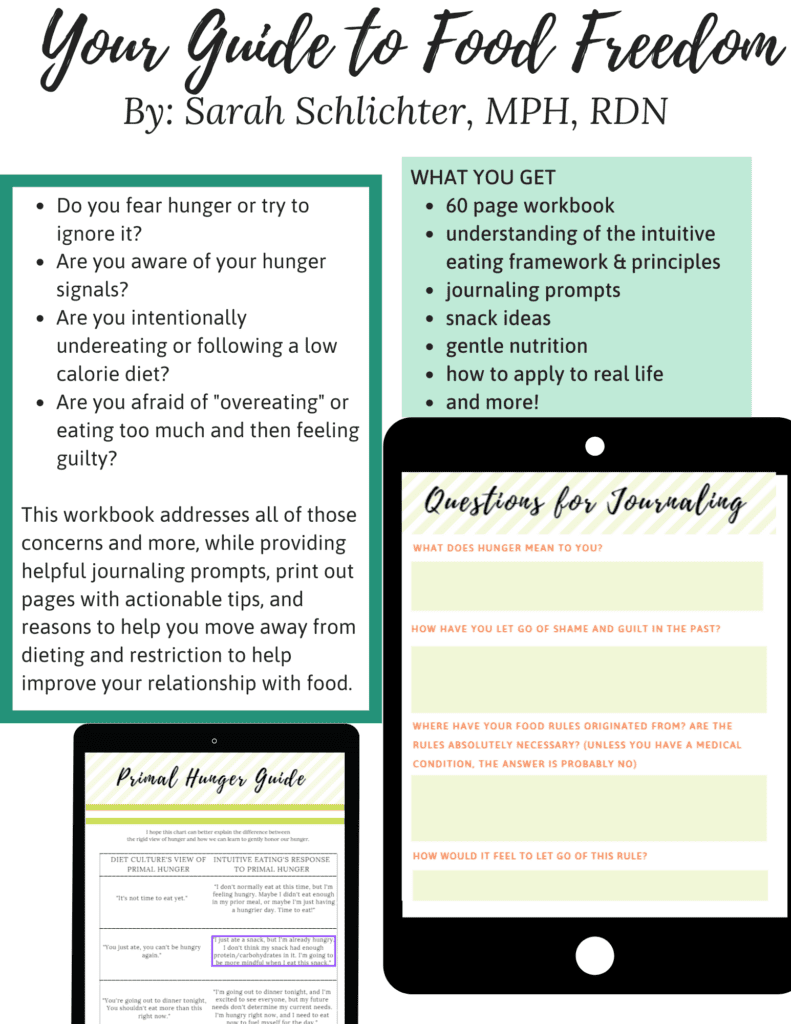






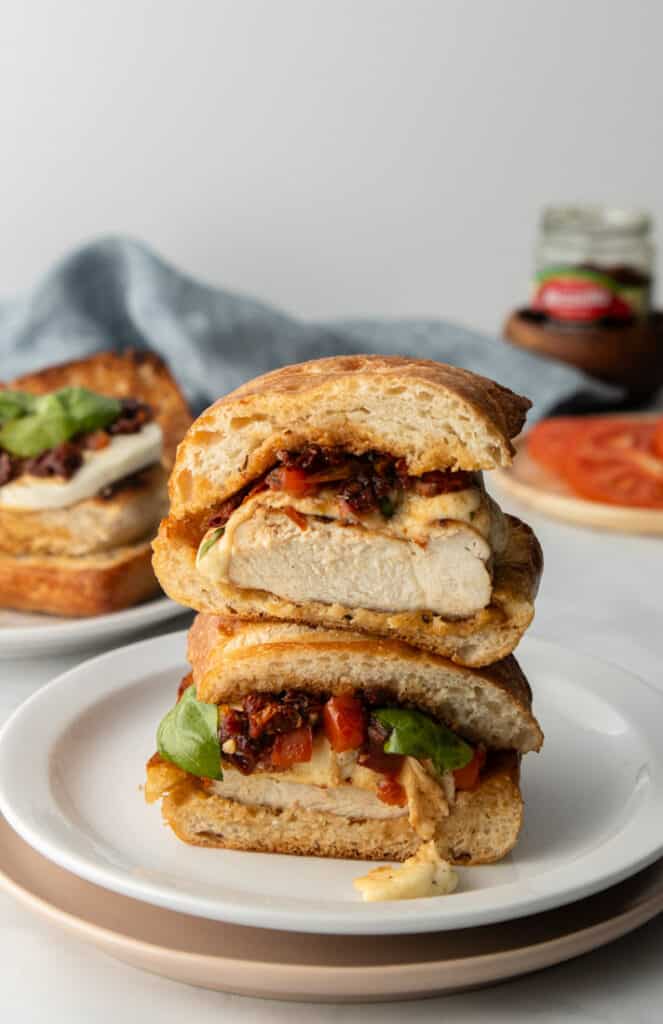



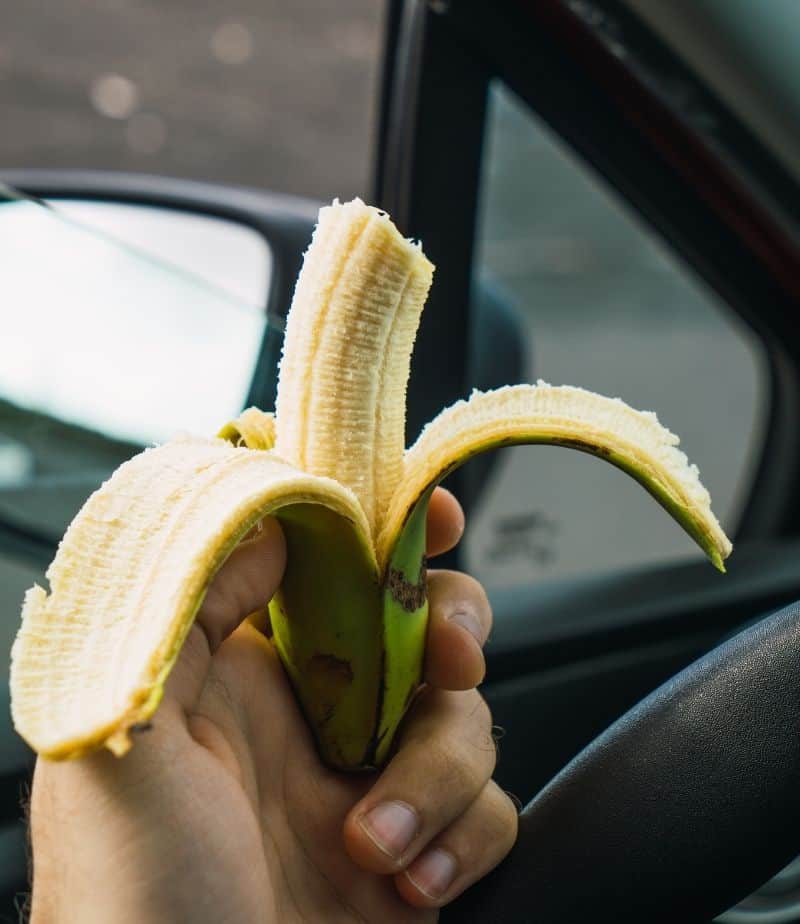
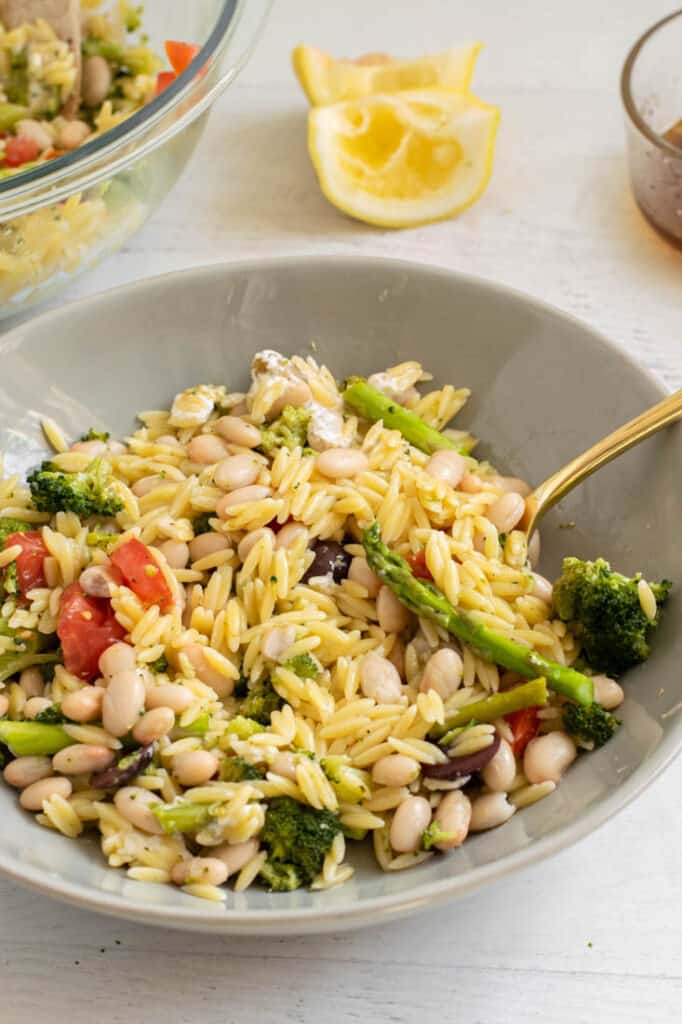

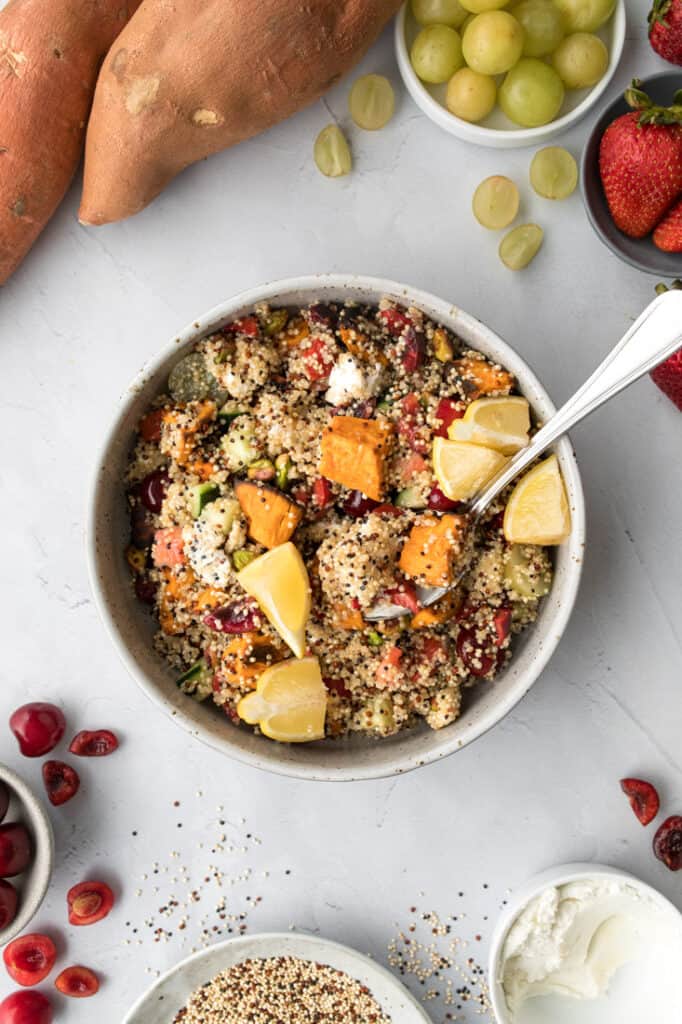


Like This Content?
Support Bucket List Tummy